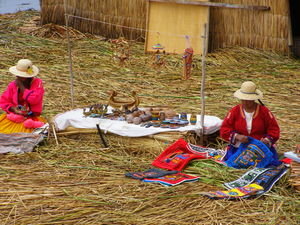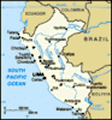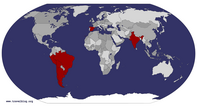Advertisement
Published: March 17th 2008

 Uros
Uros
Floating islandsWe left around 8 a.m. on a mini bus from our hotel after a night enjoying cable tv, a hot shower and listening to random whistlers all night. We couldn't work out why every few minutes, sometimes more frequently, until dawn, we heard whistles from across the road. Turns out it's a security measure for the school across the road, the security guards keep in contact by whistle, 2 blows means all is well, short frequent blows or none at all means there's trouble.
We got on board a boat with about 12 others and a guide plus captain and went to our first destination, Uros Island. Uros Island is one of 40 floating islands on Lake Titicaca. These are entirely man made islands constucted from reeds which grow in the lake. Uros is populated by 7 families, everything including the houses are made from reeds. It was quite a strange feeling to walk on the surface, quite spongy. We were taken into one big room and sat on bench-like furniture (also made from reeds!) and were given an info talk about the islands and the people. The reeds are also edible, we had a taste, they peeled the white
end like a banana. It tasted to me kind of like a spongy, tasteless cucumber. It takes about 8 months to construct an island, they may last anything from 15 to 30 years depending. They are anchored into the lake so they don't move, but the inhabitants can actually move the island if they want by attaching it to boats to pull it along. Women have their babies there, they treat anyone who is sick with natural herbs, and kids are schooled there until they are high school age when they have to go onto the mainland. After our talk we were invited into one of the houses (which was basically one small room with a bed) by a woman who talked to us about her life on Uros. She said she enjoyed it but sufffered from rheumatoid arthritis because of the constant damp. It was really fascinating. After that we saw another similar but smaller island before getting on the boat for another 2 hours.
Our next destination was the island of Amantani, not a floating but a "real" island with 4000 inhabitants. We were met off the boat by women dressed in traditional outfits - coloured skirts, white blouses embroidered with brightly coloured flowers, wide coloured belts and black shawls with luminously brilliant flowers also embroidered on them. The men wore black trousers, black vests over white shirts and black hats. Our guide read out the name of one of these people and they were allocated as our "·homestay" family. When our turn came a girl of about 10 years old came forward, greeted us and introduced herself as Rosalita. We then set off and followed her up the hill towards our "home" for the night. We parted off the main path and up to a small fence. We walked into a small courtyard area which had 3 small buildings on the right, left and at the back. We were then met by our "dad" and "mum" - a small, shy kind of man and a small but rotund woman with a lovely smile and the customary 2 long plaits down her back. They showed us to our room which turned out to be the small building on the left. In it was a double bed at one end, 2 single beds at the other and a table in the middle. The room on the right turned out to be a simple kitchen and the back was the family living/sleeping area.
"Dad" told us to sit at the table in our room and soon came out with 2 cups of boiling water and a small bowl of mint for mint tea. As we sat and drank the tea another little girl, smaller than the first, walked by and gave us a cheeky smile. Katina, dressed in a kind of shabby jumper and grubby skirt, her little feet and sandals covered in mud. When we finished our tea we sat in the courtyard and talked (in Spanish) to the father (John did most of the talking and I tried to string a few sentences together, and trail off when I didn´t know how to finish it, hoping John would do so for me.) Katina soon emerged with a soccer ball and kicked it to us, obviously quite confident around us adult gringos. Yet another little girl then appeared, turns out the family had 4 little girls aged from 10 to 1. This little one was gorgeous, shyer than her sisters but equally as curious and wore a kind of a mock frown on her face when she looked at us. She was dressed pretty much like the others in a shabby jumper and skirt but she wore the biggest hat for such a tiny person, the length of which trailed the length of her little back, the front a kind of flower design so her head peeped out like the middle of a sunflower. After playing with the ball we had a run around with the kids in the little garden and I was amazed at how at ease they were with us, they would run up and tickle us, laughing hysterically. Even managed to crank a smile out of little frowny flower face.
We ate lunch in the kitchen area, a very basic space. The islanders are mostly vegetarians, except for special occaisions. We ate vegetable and quinoa soup, omlette, potatoes and tomatoes followed by mint tea. We had a short rest and then Rosalita took us down to the meeting spot where we were supposed to start a walk up the hill to get a view of the island. Before we left the house, the family gave us wooly hats to wear, the dad saying "it's very cold". Not wanting to be rude and say "we have our own hats" we put them on. When we reached the meeting point it became apparent that everyone else's families had said the same to them, so there we were, around 15 gringos sitting on a wall wearing virtually the same wooly hats.
It started pouring rain so after standing in the cold for a while we all huddled into a little shop/cafe place. John and I were delighted by the fact that they had hot chocolate on the menu, and even more delighted that it came with a shot of Pisco (we had drunk our fair share of Pisco in Chile, but it's actually originally from Peru and the Chileans stole it. The Peruvians said "You can´t have Pisco as your own. We have a town called Pisco and you don´t!" So what did the Chileans do? Put a pub and a church in the middle of nowhere and called it Pisco! And drink it as if they invented it!) Once the rain stopped a few people went and played football while we sat and chatted to an American couple. At this time the guide came along and told us that there would be a small fiesta that evening in the school hall. John was just cracking open a bottle of beer when the dad arrived, so he brought the bottle and we trotted off back up the hill to the house where we had a dinner of soup and rice with vegetables and tea. John offered the beer to the father who was delighted and before having a glass, poured some on the land "because the land likes it too" and also some to his wife who was also delighted. We had wished we had brought a few more bottles with us but just hadn't been sure of the etiquette, whether they drank beer or if it would be rude to assume so etc. We then gave the family some gifts which we had brought them. The tour company advises bringing food so we brought a packet of rice and they also said toilet paper, which we gave them as well. I felt bad about such crap things - we hadn't brought stuff for kids because we didn´t know anything about the family before we met them.
After dinner we went into our candlelit room (no electricity or running water on the island, at least not in the houses) where "mum" dressed me in the traditional dress, just like the women had been wearing at the port that day, (the thick belt was tied really tight way up under my bust, almost like a corset, but proved handy for keeping money and tissues in later) and John got to wear a poncho. I left my trousers and boots on as it was freezing, so I looked like a kind of quasi traditional gringo with hiking boots on. Turns out most of the other gringo girls looked the same! Rosalita looked on with the littlest one, Elizabeth, 1, on her lap, who watched us with wide eyes. We then set off for the school hall with the dad and Rosalita. We were pretty much the first to arrive. A bar had been set up on the stage which basically consisted of a table with rows of coke, water and beer neatly arranged and tended by an older very smiley man in one of the wooly hats like we had been wearing that day. Rosalita sat with us while her dad chose to sit up on a bench behind the "bar". We chatted with Rosalita about her taste in drinks (she loves all manner of pop) so John asked her dad if it would be ok to get her a coke and did so, getting him a beer as well. When he brought it back to her she placed the plastic cup on top of the unopened bottle and put it on the windowsill behind us. When John asked her if she was going to drink it she said "no, I want to take it home and share it with my mum".
The band turned out to have an average age of about 13 but were good all the same, playing traditional Peruvian tunes, their repetoire consisting of about 3 songs. As soon as they started, men, women and children were on their feet, dancing away. I was taking some photos and had just sat down when an older local guy came and grabbed me to dance. You basically hold both hands of your partner and swing from side to side, pretty easy although energetic as well. Variations are twirling the girl around and then sort of holding your hands to the side and both spinning one way and then the other. It was really fun! We took turns in dancing with Rosalita who was barely off the dance floor but all the time keeping an eye on her coke.
And so it went for a couple of hours, dancing in pairs and also in a big circle. We walked back from the fiesta in the pitch dark, grateful for our little torches. We headed off to bed. It was cold but we had a few heavy blankets on the bed. There were chamber pots under the bed - lucky as neither of us fancied a midnight jaunt to the outdoor loo in the pitch black and freezing, when it was also likely it would be raining.
We were up at 7, breakfast of pancakes and tea and then off to the boat. I had asked Rosalita at the fiesta about who made the wooly hats we had been given to wear the day before and who made the clothes I was wearing. Turns out the dad made the clothes and embroidered them with a machine, and they both knitted the hats. I asked them at breakfast if they sold the hats and they did, so as we left we gave them some money for one. We said our goodbyes to the kids and went off with the dad to the port.
The last island to visit was Taquile. We walked up a hill to a square, looked at a photography exhibition and a co-op market, had lunch at a restaurant with an amazing view (trout of course!) and were back on the boat and back to Puno by 3.30, back at our hotel by 4, the only guests in the whole place! Whilst I enjoyed getting back to my hot shower and cable tv, I also reflected on the whole experience and tried to categorise the pros and cons and my feelings about it.
Humbling: These people with nothing , all living in one room, giving us food and shelter and opening their lives for us to experience.
Strange: Did we really belong in their environment? Were we treating them like some kind of zoo animals? What did they think of us? John and I were talking about this at the fiesta. There was a group of younger Aussies and Brits, all taking photos of anything that moved the whole night, and it started to get a little annoying. At one stage all the girls stood in a line and lifted up one of their skirts to reveal the 2nd skirt underneath, all posing like can-can dancers. I thought it was really crass and embarrassing and disrespectful of a culture where the women (and men for that matter) are rather shy. What is their concept of "our world" and is it even important or even natural that they are exposed to it? The father of the family asked John at one stage "How many families are there in Ireland?" - that being his concept of the population of a place. Is it natural or good that we waltz in, buy them coke and beer, eat their food and leave again?
Impressed: These kids with nothing, smiling, laughing, seemingly well adjusted to adults (not shy of initiating a game with us) So family orientated - Rosalita saving her coke, helping her mum with the baby without a hint of complaint. Not a peep from any of the kids in fact the whole time we were there.
Pathetic: For rocking up with only a stupid bag of rice and some toilet paper.
Inspired: John and I have talked about wanting to do some volunteer work and had wanted to on this trip but didn't get around to organising it. Maybe this experience will spur us on.
Advertisement
Tot: 0.09s; Tpl: 0.012s; cc: 12; qc: 55; dbt: 0.0529s; 1; m:domysql w:travelblog (10.17.0.13); sld: 1;
; mem: 1.2mb









